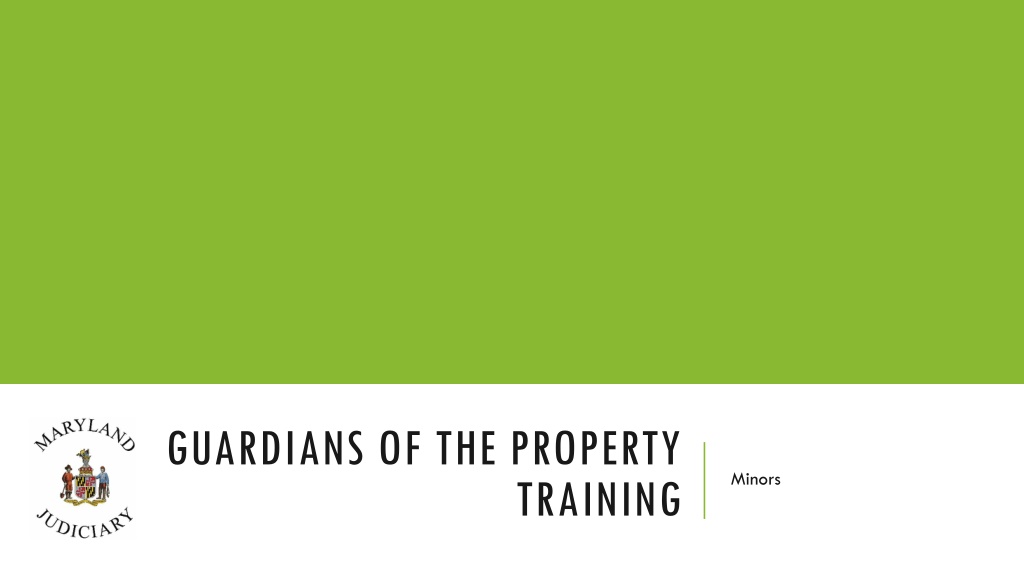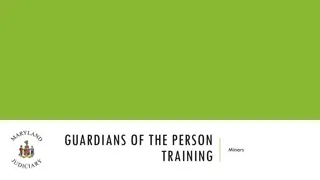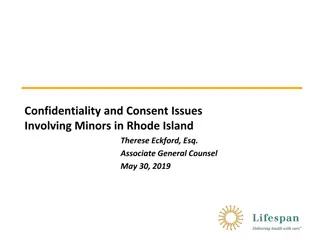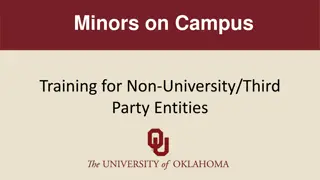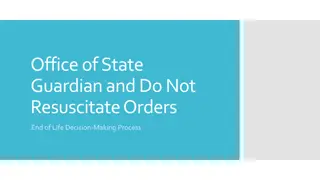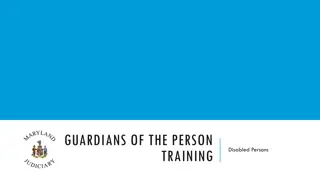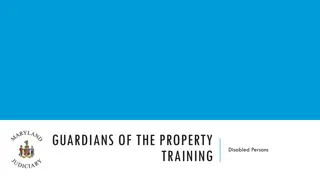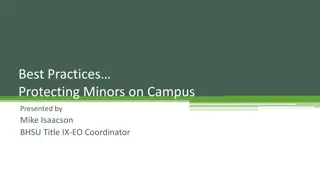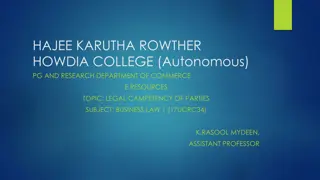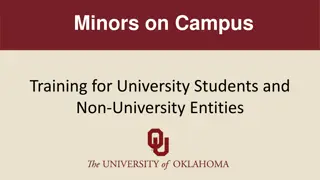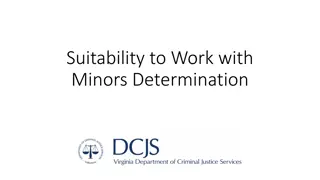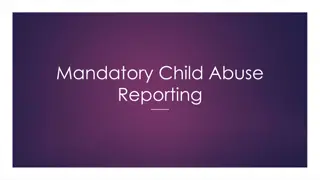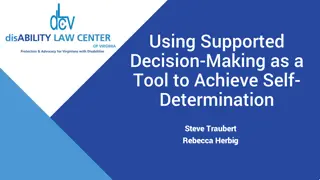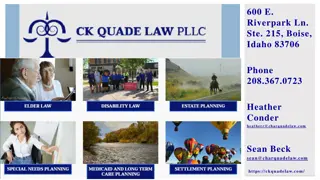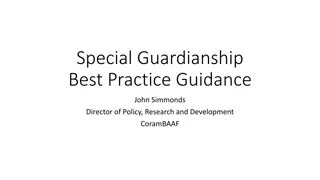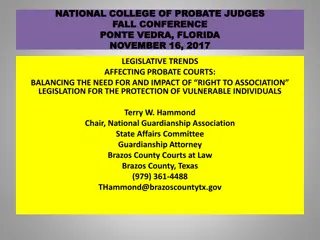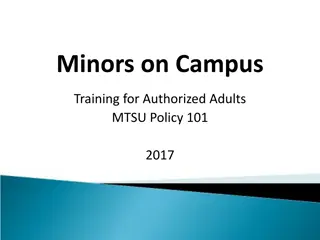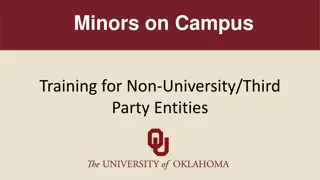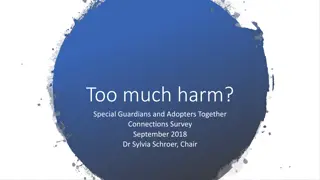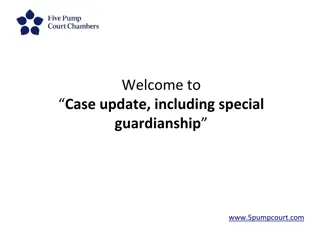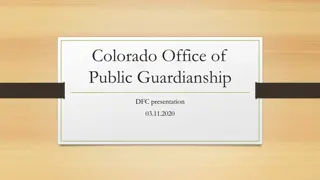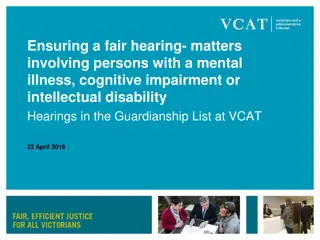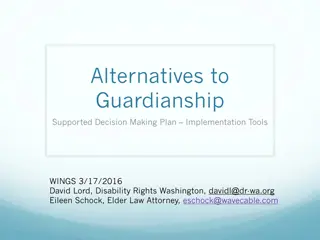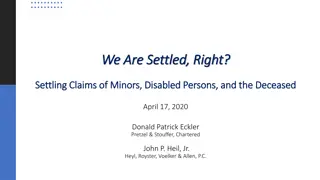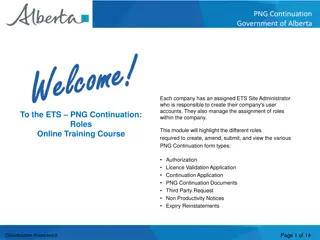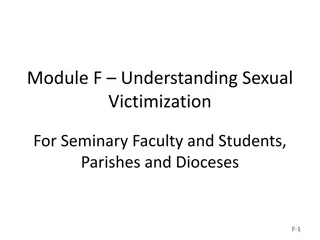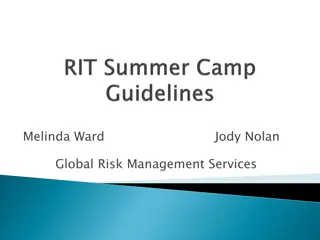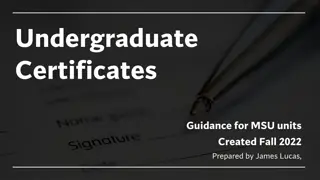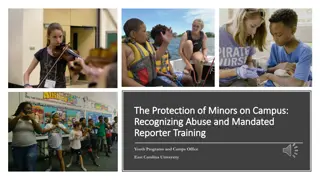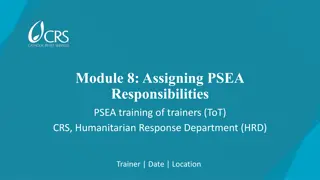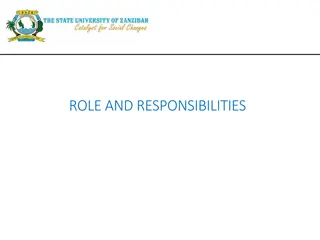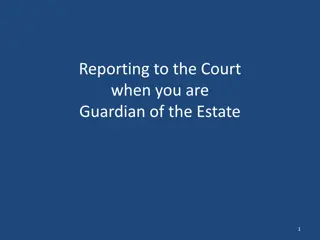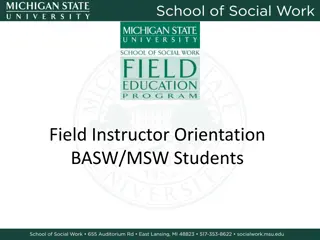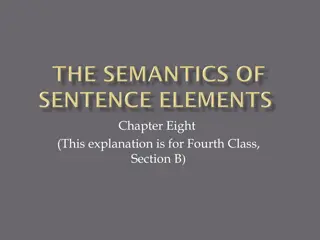Understanding Guardianship for Minors: Terms, Roles, and Responsibilities
Guardianship for minors involves the court appointing a person to manage a minor's affairs, including property and personal needs. This comprehensive guide covers guardianship terms, roles, powers, duties, abuse prevention, and changes to guardianship arrangements, providing valuable insights for those involved in or seeking information on minor guardianship.
Download Presentation

Please find below an Image/Link to download the presentation.
The content on the website is provided AS IS for your information and personal use only. It may not be sold, licensed, or shared on other websites without obtaining consent from the author. Download presentation by click this link. If you encounter any issues during the download, it is possible that the publisher has removed the file from their server.
E N D
Presentation Transcript
GUARDIANS OF THE PROPERTY Minors TRAINING
WELCOME Part 1: Guardianship terms Part 2: Role, powers, and duties Part 3: Abuse, neglect, and exploitation Part 4: Changes to the guardianship
PART 1: GUARDIANSHIP TERMS Guardianship terms Guardianship Minor Court Guardian Guardianship Estate Clerk/Trust Clerk/Register of Wills Interested Persons
GUARDIANSHIP Guardianship is a legal proceeding in which the court appoints a person to manage the affairs of a minor s person, property, or both.
MINOR Lacks the legal capacity to provide for his or her daily needs or manage financial affairs. Person under the age of 18 who is under guardianship. Also called: Ward
COURT The court is the ultimate guardian You are its agent Monitors the guardianship Review reports Address issue or problems
GUARDIAN Two types: 1. Guardian of the Person 2. Guardian of the Property (Fiduciary) Co-Guardians
GUARDIANSHIP ESTATE The minor s assets (property) under guardianship, including any: Income Real or personal property Benefits Stocks, bonds, investments
CLERK/TRUST CLERK/REGISTER OF WILLS Court employee whose responsibilities may include: Managing the guardianship case Processing all case paperwork Collecting fees Providing court forms Sending out notices Answering questions about court process Reviewing reports Reporting problems to the court
INTERESTED PERSONS The law defines Interested Persons in a guardianship to include: The minor The minor s Parents Siblings (aged 18+) Heirs Agencies the minor receive benefits and services from Any other persons named by the court
PART 2: ROLE, POWERS, DUTIES Role, powers, and duties Filing and reporting requirements Commissions and expenses Government Benefits
ROLE AS GUARDIAN OF THE PROPERTY Fiduciary Primary Responsibilities: 1. Act only in the best interest of the disabled person 2. Manage the disabled person s money and property carefully 3. Keep the disabled person s money separate from your own 4. Keep good records
DECISION-MAKING STANDARD [E]xercise the care and skill of a [person] of ordinary prudence dealing with his/her own property. Spend money only with prior court approval Read the guardianship order carefully What you can and cannot do Proof of appointment and your authority Mismanagement can result in: Removal as guardian Lawsuit Repay guardianship estate
WITH COURT APPROVAL: Cover Expenses Pay bills, arrange for clothing, education, health, welfare Collect income Including rents, inheritances, Social Security, other government benefits Manage property Including rental property (e.g., entering into and enforcing leases, making repairs/improvements, collecting income, hiring agents) Pay Taxes Prepare and file state and federal taxes before April 15thof each year You must file taxes in the minor s name and social security number and signed by you as Guardian for [name of minor], a minor. Financial Planning Ensure guardianship estate covers current and future needs (hiring accountants, financial advisors, other professionals)
COURT AUTHORIZATION You MUST get court authorization to: Ask the court for permission in writing Make loans from the guardianship estate Sell any assets in the guardianship estate Pay expenses over the amount authorized in the guardianship order (If there is not authorization in the order, you should not be paying any expenses without court approval) Extend the time to file the Annual Fiduciary Report/Guardianship Account Close a guardianship account Pay taxes Sell or exercising stock subscriptions
FILING AND REPORTING REQUIREMENTS Inventory File within 60 days of appointment date Circuit Court: Use Form CC-GN-011 Orphans Court: Use Form RW1318 Include description and fair market values of Bank accounts Stocks and bonds Real estate Mortgages Other valuable property
FIDUCIARYS/GUARDIANS ACCOUNT File each year within 60 days of appointment date Example: Date of March 1, 2017 Appointment Each year by April 30th Account Due Circuit court: Use Form CC-GN012 (Fiduciary s Account) Orphans court: Use Form RW1302 (Guardian s Account)
FIDUCIARYS/GUARDIANS ACCOUNT Expenses and disbursements Value of assets and bank accounts Income received Attach Documentation to Fiduciary s/Guardian s Account Investment, or other account statements Copies of cleared checks and deposits Receipts for all items purchased using funds from the guardianship estate Settlement sheets on the sale or transfer of real property Paystubs Annual social security benefit reports Nursing home or in-home care expenses
FIDUCIARYS/GUARDIANS ACCOUNT Provide copies to Interested Persons (upon request) Court review Order accepting account Other actions Order to appear or provide additional documentation Failure to file or address problems Show cause order Hearing *Keep good records!
COMMISSIONS AND EXPENSES Based on value and size of the guardianship estate Reimbursement for actual and necessary expenses Commissions Income commissions Corpus commissions Commissions on the sale of real property
GOVERNMENT BENEFITS Deposit benefits to a guardianship Account www.ssa.gov/payee Social Security Administration (SSA) Supplemental Security Income (SSI) Social Security Disability Insurance (SSDI) Apply to become a Representative Payee Annual recertification Public Assistance for SSA Beneficiaries Local Department of Social Services (DSS) Visit a local Social Security Administration office U.S. Department of Veterans Affairs (VA) Apply to become a VA Fiduciary www.benefits.va.gov/fiduciary Visit a local VA office
PART 3: ABUSE, NEGLECT, AND EXPLOITATION Types and signs People under guardianship often targeted because of: Age Physical, intellectual, or emotional limitations Dependence on others for basic needs Inability to communicate they are being hurt Limited ability to recognize and avoid danger A signal indicator is usually not proof Look for patterns or suggestions of a problem Victims of crime can suffer from physical psychological, and financial injuries
PHYSICAL ABUSE Complaint Unexplained or poorly explained injuries Use of force that may result on bodily injury, physical pain, or impairment Fractures, sprains, dislocations, bleeding Hitting, beating, pushing, shoving, shaking, or slapping Bruises, bites, cuts, sores, burns, scars, head trauma Behavior Changes Signs Withdrawal, aggression, regression, depression Substance abuse, attempts to escape, wariness, fear Sudden Changes Kicking, pinching, choking, hair pulling, or burning Weight loss, tooth loss, or hair loss Use of drugs or physical restraints, force-feeding, reckless driving, physical punishment Different explanations for injuries Fear of a particular person Frequent/suspicious hospitalizations Delays in treatment Other
SEXUAL ABUSE Complaint Nonconsensual sexual contact of any kind Injuries Includes: Rape and molestation Sexual conduct with a person unable to consent Behavior Changes Victims include: Women and men Children and people with disabilities especially vulnerable Inappropriate, unusual, or aggressive behavior Bedwetting, sleep disruptions Fear of the dark, avoids undressing, overdresses Signs
EMOTIONAL ABUSE Complaint The infliction of pain, anguish, or distress Changes Verbal assaults, insults, threats Weight loss or gain Depression, confusion, agitation, withdrawal Physical signs Also known as psychological abuse Signs Intimidation, humiliation, harassment Rashes, hives, facial tics, stomach aches, elevated blood pressure Isolation from family, friends, activities Nervous habits (biting, rocking, head- banging, bedwetting, thumb sucking)
PERPETRATORS OF ABUSE Can be anyone Often someone the victim knows Family members Acquaintances Dating partners Caregivers
NEGLECT Poor hygiene (lice, scabies, severe or untreated rashes or wounds, bedsores) A caregiver s refusal or failure to provide for a person s basic needs Food, water, clothing, shelter Personal hygiene, medication, comfort, personal safety Malnutrition or dehydration Hazardous or unsafe conditions (bad wiring, no heat, poor plumbing, unsanitary conditions) Dirt, fleas, bed bugs, soiled bedding, odors Passive neglect Caregiver unable to fulfill obligations Inadequate clothing, lack of basic medical care or medications Intentional neglect Caregiver able to but refuses to fulfill obligations Exposure to elements (sunburn, bites, cold) Neglectors can be family members, caregivers, or staff at care facilities Behaviors that are not age-appropriate (wetting, soiling)
RESPONDING TO SUSPECTED ABUSE OR NEGLECT If someone is in immediate danger, call 9-1-1. Suspect abuse? Child Protective Services (under 18 years old) Adult Protective Services (over 18 years old) Investigate concerns about the safety or well-being of children and vulnerable adults Offer services and support Leave investigation to the professionals
PREVENTING ABUSE AND NEGLECT Visiting the person under guardianship Monitor care Track changes Behavior, physical appearance, physical surroundings Specific complaints Unexplained injuries or conflicting explanations Depression, fear, agitation, withdrawal Appropriate clothing, hygiene, living space Track people Specific complaint Reluctance/unwillingness to see certain people Interference by others Is money paid being used properly? Receiving proper care? Food, housing, clothing needs met? Suspicious doctor/hospital visits? Conflicting explanations for injuries?
FINANCIAL EXPLOITATION Theft Theft or misuse of another person s money, property, or belonging for personal benefit Deception Harassment Threats Taking money or personal property Fraud Acts of deception or misrepresentation Falsification of documents, forgeries, check fraud, investment fraud, mortgage fraud, insurance fraud Identify Theft Illegal access to and use of personal or financial information (name, SSN, DOB, credit card/bank account numbers) Marketing/Lottery Scams Guardians of the Property Can identify, stop, and prevent financial exploitation Beware False promises of cash, services, or goods in exchange for fees, donations, or personal information Phone, e-mail, mail, ads, or in-person Many types of financial exploitation
SIGNS OF FINANCIAL EXPLOITATION Missing money or property Frequent or large gifts to caregivers, someone with access, new friends Unauthorized withdrawals or transactions, new names on accounts Changes to wills, life insurance policies, retirement accounts Services or goods that are paid for but not rendered Missing mail, alerts about new accounts Pressure to use guardianship powers inappropriately
PREVENTING FINANCIAL EXPLOITATION Restrict access to accounts or property Tips: Never write blank checks Do not share: Social Security Number Credit card information Account numbers Passwords Get a safe Don t sign if you don t understand Watch for undue influence Keep good records Money in and out Actions you take Secure records Watch for too good to be true deals Monitor people Monitor accounts and bills
FINANCIAL EXPLOITATION Remember: Culprits may be friends, family, caretakers, financial planners, strangers, or con artists Signs include: Missing money Unauthorized transactions Unexpected alerts about new accounts Prevention requires: Good recordkeeping Guarding financial information and documents
PART 4: CHANGES TO THE GUARDIANSHIP Termination Resignation Removal End of Appointment
TERMINATION The guardianship can terminate when: Minor turns 18 Becomes emancipated (marriage) Minor dies Petition to terminate filed by a parent Turns 18 Include a copy of birth certificate or other proof of age Emancipation by married Include a copy of marriage certificate File Petition to Terminate the Guardianship Within 45 days Show cause order Mail to Interested Persons Hearing Death of minor Include a copy of death certificate Minors with disabilities File: Petition for Guardianship of Alleged Disabled Person (Form CC-GN-002) Guardians of the property Include a Final Fiduciary s/Guardian s Account Proposal for distribution of remaining assets Continue responsibilities until the court orders termination of the guardianship
RESIGNATION No longer able to serve? Petition to Resign as Guardian May request: Substituted or Successor Guardian (replacement) Guardians of the property: Include a final Fiduciary s/Guardian s Account Show cause order Mail to Interested Persons Resignation not automatic Hearing Continue responsibilities until the court enters an order accepting your resignation
REMOVAL Removal as guardian by: Court Show cause Interested person Petition for Removal of Guardian Hearing Removal Perform neglected duties Other sanctions Court order for removal as guardian Appointment ends Guardians of the Property: File a final Fiduciary's/Guardian s Account
END OF APPOINTMENT Rights and responsibilities end upon termination Does not discharge you from liability for wrongful acts
QUESTIONS? Visit: www.mdcourts.gov/guardianship Forms Videos Resources
GUARDIANS OF THE PROPERTY Minors TRAINING
